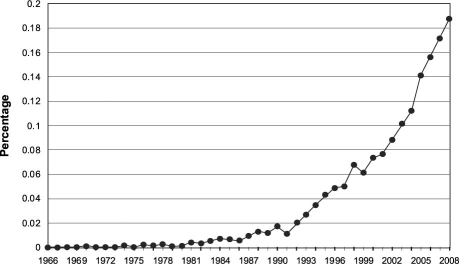[I’m preparing my paper for the AERC 2016 and have less time for original content, so I thought I would bring to your attention this editorial I wrote a few years ago. I hope you enjoy it. Figure 1 in this article is my most important contribution to empirical science to date!]
There was a time when the foretelling of future events was an undertaking of prophets, palm-readers, and weathermen. In recent years, however, the medical profession seems to have embraced this activity with a great deal of enthusiasm. A prime example is the use of the term “predicts” in the titles of journal articles dealing with human subjects. According to a search of the MEDLINE® database, “predicts” appeared a total of only 13 times before 1980.1 Since then, however, the occurrence of the term in citation titles has increased dramatically. Expressed as a percentage of the annual number of MEDLINE publications, the trend follows a curve that could be described as hyperbolic (Fig. 1).


This curve would seem to track with federal funding of outcomes research. It would be useful for someone to go back to every paper that predicted an outcome of some sort, and look back at those predictions 5, 10 and 20 years later to see if any of them held up. If the predictions didn’t hold up, then it would be a fine time to save money by scrapping federal funding of all such fortune telling. Were we not told quality of care would be improved and the cost of care decreased with the advent of the ACA, with the advent of ACO’s, with the advent of EHR’s? There was talk of bending the cost curve. However the cost curve has been bent in the opposite direction of what was intended. Is there a correlation here with government meddling in healthcare through central planning, or just the law of unintended consequences?
Both!